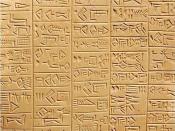Many ancient civilizations were considered naive, uncivilized, and utterly barbaric. However, this is not true; many of these societies formed complex writing systems, created concrete laws, and discovered advanced math and architecture. Many of these precedents are what current ideas and practices are based on.
Writing and the idea of an alphabet was one of, if not the most brilliant addition to the overall development of societies around the world. It lets one share ideas and views on different subjects throughout time; writing lasts when the writer has expired. Egyptian hieroglyphics and Sumerian cuneiform were infinitely complex because each word had a symbol or many different symbols. The Phoenicians made a giant leap forward in simplifying writing. A phonetic alphabet has a mark for each sound made, and words are created by putting these characters together. Writing increased the ease of communication everywhere. It will always be used for as long as humanity continues on.
Written law is another advancement made by different societies. This stops any argument as to what the law decides, and the penalties provided by law. Hammurabi was a Babylonian ruler who codified law. In this law aristocracy and the upper-class were treated differently from the lower-class citizens. This is in obvious disagreement with the Hebrew Ten Commandments where all people, kings and vagabonds are treated equal. The Law today in the United States is based mainly on the Ten Commandments, as are most laws around the world.
The Egyptians and Sumerians both used geometry and architecture to build many large temples and tombs. Egyptians also invented geometry so they could redraw farm boundaries after yearly floods. Sumerians built complex ziggurats, or pyramidal towers with stages or stories each smaller than the one below. We expanded these branches of mathematics to meet our needs to build...


